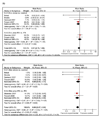Preventive zinc supplementation in developing countries: impact on mortality and morbidity due to diarrhea, pneumonia and malaria
- PMID: 21501441
- PMCID: PMC3231897
- DOI: 10.1186/1471-2458-11-S3-S23
Preventive zinc supplementation in developing countries: impact on mortality and morbidity due to diarrhea, pneumonia and malaria
Abstract
Background: Zinc deficiency is commonly prevalent in children in developing countries and plays a role in decreased immunity and increased risk of infection. Preventive zinc supplementation in healthy children can reduce mortality due to common causes like diarrhea, pneumonia and malaria. The main objective was to determine all-cause mortality and cause-specific mortality and morbidity in children under five in developing countries for preventive zinc supplementation. DATA SOURCES/ REVIEW METHODS: A literature search was carried out on PubMed, the Cochrane Library and the WHO regional databases to identify RCTs on zinc supplementation for greater than 3 months in children less than 5 years of age in developing countries and its effect on mortality was analyzed.
Results: The effect of preventive zinc supplementation on mortality was given in eight trials, while cause specific mortality data was given in five of these eight trials. Zinc supplementation alone was associated with a statistically insignificant 9% (RR = 0.91; 95% CI: 0.82, 1.01) reduction in all cause mortality in the intervention group as compared to controls using a random effect model. The impact on diarrhea-specific mortality of zinc alone was a non-significant 18% reduction (RR = 0.82; 95% CI: 0.64, 1.05) and 15% for pneumonia-specific mortality (RR = 0.85; 95% CI: 0.65, 1.11). The incidence of diarrhea showed a 13% reduction with preventive zinc supplementation (RR = 0.87; 95% CI: 0.81, 0.94) and a 19% reduction in pneumonia morbidity (RR = 0.81; 95% CI: 0.73, 0.90). Keeping in mind the direction of effect of zinc supplementation in reducing diarrhea and pneumonia related morbidity and mortality; we considered all the outcomes for selection of effectiveness estimate for inclusion in the LiST model. After application of the CHERG rules with consideration to quality of evidence and rule # 6, we used the most conservative estimates as a surrogate for mortality. We, therefore, conclude that zinc supplementation in children is associated with a reduction in diarrhea mortality of 13% and pneumonia mortality of 15% for inclusion in the LiST tool. Preventive zinc supplementation had no effect on malaria specific mortality (RR = 0.90; 95% CI: 0.77, 1.06) or incidence of malaria (RR = 0.92; 95 % CI 0.82-1.04).
Conclusion: Zinc supplementation results in reductions in diarrhea and pneumonia mortality.
Figures





Comment in
-
Facing COVID-19 and Refugee Camps on the U.S. Border.J Emerg Med. 2020 Jul;59(1):143-145. doi: 10.1016/j.jemermed.2020.04.041. J Emerg Med. 2020. PMID: 32900460 Free PMC article. No abstract available.
References
-
- Caulfield L, Black RE. In: Comparative quantification of health risks: global and regional burden of disease attributable to selected major risk factors. Ezzati M, Lopez AD, Rodgers A, Murray CJL, editor. Geneva: World Health Organization; 2004. Zinc deficiency.
-
- Gibson RS, Ferguson EL. Assessment of dietary zinc in a population. Am J Clin Nutr. 1998;68(2 Suppl):430S–434S. - PubMed
-
- Shankar AH, Prasad AS. Zinc and immune function: the biological basis of altered resistance to infection. Am J Clin Nutr. 1998;68(2 Suppl):447S–463S. - PubMed
-
- Prasad AS. Discovery of human zinc deficiency and studies in an experimental human model. Am J Clin Nutr. 1991;53(2):403–412. - PubMed
-
- Arsenault JE, Brown KH. Zinc intake of US preschool children exceeds new dietary reference intakes. Am J Clin Nutr. 2003;78(5):1011–1017. - PubMed
Publication types
MeSH terms
Substances
LinkOut - more resources
Full Text Sources
Medical

